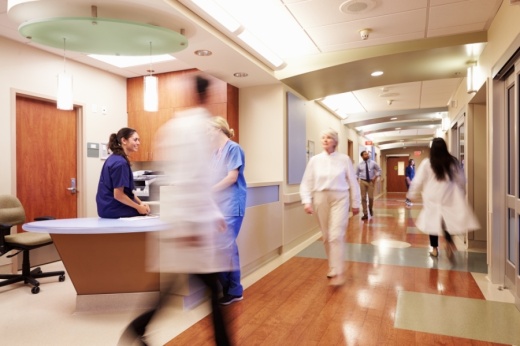Flower & Cream, at 2617 W. Holcombe Blvd., Houston, may be closing up shop temporarily beginning April 4 until April 30, but not before it donated about 1,300 scoops of ice cream to hospital workers at the Texas Medical Center, the district announced on its Facebook page April 3.
Owner Kevin Chang wanted to close down in order to keep staff safe, but donated ice cream to show appreciation for the work health workers have put in since the COVID-19 pandemic hit Houston.
"“Thank you to all the nurses, doctors and hospital staff that have been working around the clock," Chang wrote through Instagram. "We hope our ice cream will bring a little cheer to your day!”
Update 4:44 p.m. April 2
Baylor College of Medicine has begun enrolling participants in a treatment trial for adult patients with a COVID-19 diagnosis hospitalized at either Baylor St. Luke’s Medical Center or Harris Health System’s Ben Taub Hospital, the hospital announced April 2.
The study will evaluate the safety and effectiveness of novel therapeutic agents, the first which is the experimental antiviral drug remdesivir.
Update 11:40 a.m. April 2
MD Anderson Cancer Center is taking additional proactive steps to prevent introduction or spread of COVID-19 to its campuses, the hospital announced in a news release on April “Our cancer patients are uniquely vulnerable to coronavirus, said Peter WT Pisters, M.D., president of MD Anderson in the news release. "For this reason, we are committing to increased workforce precautions. By limiting our exposure to known and probable risks associated with the spread of COVID-19, namely travel-related exposure and large gatherings, we hope to contribute to our nation’s containment of this disease.”
According to the news release, the list of measures the cancer center is implementing now include:
- Restricting visitors. No visitors are allowed on campus until further notice, with limited exceptions.
- Restricting entry points and screening. Entry points across the institution are limited. All patients, visitors and employees will be screened upon entry. Screening includes questions specific to symptoms, travel and exposure.
- Distributing masks. All patients, visitors with exceptions, contractors and patient-facing employees on clinical campuses will be provided a face mask for added protection.
- Postponing non-urgent appointments. We will be postponing non-urgent outpatient visits, elective procedures and non-emergent screening imaging studies.
- Restricting incoming business or community visitors to our campuses. Campus visitors who are not caregivers and do not have mission-critical business with MD Anderson are restricted from campus until further notice.
- Closing café seating areas. We have closed all café seating areas to comply with CDC guidelines. Our cafés will be limited to take-out food only.
- Making changes to our workforce. Employees whose presence on campus is not deemed essential will be asked to work remotely, as determined by local managers.
- Limiting work meetings and social gatherings. Campus events intended for large audiences are canceled or postponed. Groups and meetings are limited to no more five people with a minimum of six feet of distance between participants.
- Suspending laboratory research. All laboratory research activities, except those deemed as essential, are being suspended.
- Modifying clinical research. Trials that cannot use remote methods of interaction are being suspended. Exceptions are for trials with curative intent or where the trial is needed for life prolonging or life-saving opportunity over current standard of care options, or when there are no standard of care options.
- Canceling all business travel, domestic and international. Travel restrictions are in place through April 29. The institution will monitor closely and re-evaluate whether an extension is needed.
- Registering all personal travel. All employees are now required to report all personal travel for themselves and anyone in their household outside of our eight-county area. The counties are Harris, Galveston, Brazoria, Fort Bend, Waller, Montgomery, Liberty and Chambers. Employees who have had recent travel to a high-risk area must obtain clearance to return to work by Employee Health. Workforce members who choose to travel internationally must self-quarantine for 14 days.
- Encouraging use of institutional Skype, WebEx and other remote participation tools to conduct meetings, when possible.
- Canceling all volunteer shifts. All MD Anderson volunteer shifts are canceled until further notice.
- Shifting classes to remote learning. MD Anderson’s UTHealth Graduate School of Biomedical Sciences and School of Health Professions transitioned to remote learning and will be continuing their classes in an online or virtual fashion until further notice.
Update 4:30 p.m. March 31
The CEOs of the Texas Medical Center, together, are in full support of Harris County Judge Lina Hidalgo and Houston Mayor Sylvester Turner’s decision to extend the Harris County “Stay Home, Work Safe” order set to expire at 11:59 p.m. on April 3 until April 30, the medical district announced in a news release on March 31.
Citing current data observed worldwide, in Houston, and surrounding communities in nine counties across the Greater Houston region, there were 876 COVID-19 positive cases as of March 30, with 249 COVID-19 patients admitted to the Texas Medical Center member institution hospitals, in addition to hundreds that are "persons under investigation" and in the process of being tested, with 114 patients in ICU units across the medical center's institutions, according to the release.
“The world’s leading physicians and scientists are working diligently every day to care for patients who need us, and now is the time for significant escalation of our joint efforts with our local government to control the COVID-19 pandemic in the Houston region," said William F. McKeon, President and CEO of the Texas Medical Center in the news release. "We fully understand the sacrifices that our community is making in these difficult times - and the next few weeks are critical."
Turner and Hidalgo announced the extension of the order during a news conference March 31, with stated support from representatives of the Texas Medical Center.
“This is a very difficult decision to make, but it’s extremely important,” said Dr. Paul Klotman, president and CEO Baylor College of Medicine during the press conference.
The number of COVID-19 cases in the greater region – normalized for population size and age – are tracking a similar infection trajectory to those of New York and Italy, though the Houston area is at an earlier stage of the infection cycle, the medical center announced in the news release.
And that is why the Houston area needs to continue its scrict social distancing practices, Klotman said.
“If we maintain a very strict social distancing the way we’re doing now, and we can keep the infection rate as low as we are currently, we will probably not exceed our capacity to care for people," Klotman said. "In addition, we think the peak will end in about four weeks. If we don’t, and we track along New York City’s infection rate, or Italy’s infection rate, not only do we exceed our peak of being able to take care of people, but we push the peak out for about another four weeks. So rather than being out home for four weeks, it’s more like eight weeks."
Update 2:57 p.m. March 30
Houston Methodist Hospital was given the green light by the Food and Drug Administration on March 28 to become the first academic medical center to transfuse donated plasma from a recovered COVID-19 patient into a critically ill patient, according to an announcement from the hospital.
The hospital began recruiting blood plasma donors the day before, March 27, from about 250 patients who have tested positive for the virus at Houston Methodist hospitals.
Willing donors each gave a quart of blood plasma in a procedure much like donating whole blood, according to the release.
Houston Methodist transfused the plasma into the ill COVID-19 patient because according to the theory being used by the hospital—convalescent serum therapy—antibodies made by the immune system in the plasma of someone who has recovered from COVID-19 may be able to kill the virus.
Update 5:10 p.m. March 27
The Texas Medical Center announced new restrictions on visitors across its hospitals and clinics in an effort to fight COVID-19.
Dozens of hospitals and clinics across the medical center are included in the announcement, though pediatric hospitals and units will be generally exempted, according to a news release from the medical center on March 27. Individual exceptions will also be managed by each institution.
Exceptions will be reviewed for visitors 18 years of age and older and include: visiting a patient with a terminal condition; patients requiring a legal guardian; and for patients with disabilities. Hospitals with neonatal intensive care and maternity and postpartum units, and life-saving care will also consider exemptions.
Update 11 a.m. March 27
The U.S. Department of Veterans Affairs announced its COVID-19 Response Plan it is executing within its medical facilities to protect Veterans, their families and staff.
Hospitals utilizing the plan include the Michael E. Debakey Veterans Affairs Medical Center, located at the Texas Medical Center.
“VA has a world-class medical team doing incredible work on the frontlines of this fight,” said VA Secretary Robert Wilkie. “We will continue to share best practices and lessons learned with other government agencies and the private health care system as appropriate so we can defeat COVID-19 as a nation.”
Outpatient care has been shifted to telehealth, and some elective and non-emergent procedures have been postponed. VA has also begun implementing two zones within all inpatient units: one for dedicated staff and space to care for COVID-19 patients, while the other will be a zone for all other care, according to the release.
"These overall changes are aimed at minimizing the risk of infection as VA’s medical professionals make decisions based on what’s appropriate for the given environment and situation," the VA announced in the release.
The Texas Medical Center announced new restrictions on visitors across its hospitals and clinics in an effort to fight COVID-19.
Dozens of hospitals and clinics across the medical center are included in the announcement, though pediatric hospitals and units will be generally exempted, according to a news release from the medical center on March 27. Individual exceptions will also be managed by each institution.
Exceptions will be reviewed for visitors 18 years of age and older and include: visiting a patient with a terminal condition; patients requiring a legal guardian; and for patients with disabilities. Hospitals with neonatal intensive care and maternity and postpartum units, and life-saving care will also consider exemptions.
Update 11 a.m. March 27
The U.S. Department of Veterans Affairs announced its COVID-19 Response Plan it is executing within its medical facilities to protect Veterans, their families and staff.
Hospitals utilizing the plan include the Michael E. Debakey Veterans Affairs Medical Center, located at the Texas Medical Center.
“VA has a world-class medical team doing incredible work on the frontlines of this fight,” said VA Secretary Robert Wilkie. “We will continue to share best practices and lessons learned with other government agencies and the private health care system as appropriate so we can defeat COVID-19 as a nation.”
Outpatient care has been shifted to telehealth, and some elective and non-emergent procedures have been postponed. VA has also begun implementing two zones within all inpatient units: one for dedicated staff and space to care for COVID-19 patients, while the other will be a zone for all other care, according to the release.
"These overall changes are aimed at minimizing the risk of infection as VA’s medical professionals make decisions based on what’s appropriate for the given environment and situation," the VA announced in the release.





